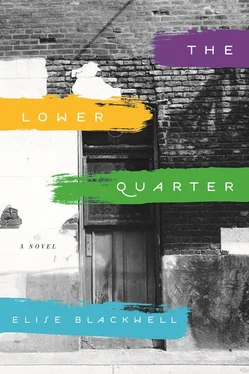The daylight out the window had diminished, and the clock verified that it was now evening. He invited her to dinner, but she shook her head, saying, “Maybe later” and pulling his shirt right back off.
Again they made love several times, and he realized they were even more well matched than he’d thought. But of course sex is always better after the first time with a person, better with a little knowledge and experience.
When both of their stomachs growled simultaneously, she consented to dinner.
As he watched her dress he saw this time the fragility of her control, realized, too, that what she hid in her daily life was not only her passion but also her fear: fear of losing what she had so carefully crafted as her life. As herself. She may have stolen the painting, but she had killed no one. She might even want to kill someone, but he felt sure she didn’t have the right combination of traits to go through with it.
Eli still had no idea what he would tell Ted, but he would not break into Johanna’s place, and he would never take anything from her that she didn’t want to give him. Even if he was wrong about some of the facts, even if Johanna had killed the man who’d died in the Hotel Richelieu, he would never hurt her. If she’d lied about Fontenot, then she’d had a reason for doing so. And if she’d killed a man in the very hotel where they had just made love, then it must have been a man who needed to die. Eli was sure of this as he felt his moral compass align with Johanna and Johanna alone.
Clay
Perhaps it was simply because his book was finally finished, but Clay began to notice things that were whole. The moon was gibbous and waxing, soon to be full. His sight was drawn to bulging shapes: ripe oranges, a water-swollen newspaper straining its rubber band, the thick books squeezed into the full shelves of the Fontenot library. Despite the ongoing presence of ruin in the city, the sense that the people whose paths he crossed were in the middle of a work in progress, Clay’s world was dominated by a feeling of wholeness and completion.
It had been difficult to get the phone number and harder still to convince the man on the other end of the line that he was not a nut job or a reporter. “It would be a first,” the man told him on their third phone call, and Clay could tell from looking into the IP addresses on the websites mentioning him that someone in England was checking into him. “Generally people are seeking products made from materials sourced elsewhere,” the man said, his vocabulary no doubt ginger by design and through practice. “There are legalities to consider as well as practicalities and logistics.”
Clay had learned a few tactics from his father. One was to make the person you’re negotiating with think that you are the one hesitating, that you are the one with concerns and about to back out. “Obviously,” he said, “I would need an iron-clad contract to make sure that my instructions are followed to the letter.”
By their fourth conversation, they were talking numbers, and Clay knew by then that it was just a matter of naming one high enough, which he would very soon be in a position to do. Even his father had brought up the subject of his trust, though he failed to understand that Clay having access to his inheritance changed the nature of their relationship completely. His father, it seemed, believed that Clay was bound to him by something other than financial need, perhaps the fabled filial affection or duty or else some sad desire for parental approval. For days Clay had been grinning in the mirror when he imagined the moment when his father happened upon the realization that this was not the case.
It was this fourth conversation that his father interrupted, and Clay cut it short to follow him outside. Unlike most large homes in New Orleans, or perhaps even most small ones, theirs did not have a front porch. As a child, Clay had wondered how much that defined them, made them less friendly, their lives more occluded, their motives more sinister. But of course his father had chosen the house, not the other way around.
They sat in the back, looking over the semiformal gardens that the landscape-maintenance company had quickly put right after the storm. His father took pride in the variety of roses, many of them rare, but not enough actually to touch dirt himself. Clay had never liked the roses, which seemed too obvious and smelled too sweet when blooming. Either too full or straggly and forlorn. In the afternoon light now they looked like hands, aged or deformed, twisting through the earth at the air.
His father surveyed the roses and the lawn beyond them with a sweep of his hand. “A party in the spring, perhaps. Pimm’s cups and croquet, that sort of thing. Maybe we can even invite some prospects for you. There’s got to be some young woman willing to overlook your obvious defects, given the imminent size of your bank account.”
This was the second time that his father had acknowledged that Clay was about to come into his money — a date that he’d been able to delay five years but could delay no longer. Thinking about how wrong his father’s vision of what that meant for the future was sustained Clay’s happy smirk as his father — cliché that he always was — lit a cigar. And Clay needed that moral sustenance because he’d guessed correctly that his father was about to bring up Johanna again.
“I know you like the blond, and there’s no reason a man can’t keep comfort on the side, but we need to find you a good New Orleans girl. A well-bred girl from a good Louisiana family.”
Clay nodded, wishing his father would offer him a cigar so that he could turn it down.
“Speaking of Johanna, by the way, I feel quite certain she’s in possession of that small painting I might have mentioned to you earlier, perhaps something she inadvertently carried out of Belgium back when.”
The hatred Clay felt for his father was cold. Of course he would again try to use Johanna against him, having identified her as a weakness much more exploitable than any physical abnormality Clay had been born with and more effective than any verbal jabs at a mother Clay had never felt much affection for. “I’m quite sure she does not,” Clay said, his voice as stony as he could make it, “but even if she does, so what?”
“Some men …” his father said, pausing to puff ostentatiously several times on the fat cigar, as though he had an audience other than Clay. “For some men, their possessions are a point of pride. Naturally they wish to maintain them. No one wants something taken from him due to a moment of weakness or a moment of indulgence. You see, the missing object will then remind him forever of that moment. Its safe return returns the world to order. A place for everything and everything in its place, as your mother was fond of saying.”
“She was talking about my toys, about cleaning my room.”
“Yet even so, I have no doubt that she understood the wider implications of the sentiment. Things that are true in a specific moment very often transfer into excellent general principles, I’m sure you would agree.”
It was something his father had always said: I’m sure you would agree rather than Do you agree? Clay knew that he was close to the name Johanna wanted, and he also knew that he could not simply ask for it. He asked a less direct question: “So what’s in it for you?”
“Sometimes when a man is helpful to another man, there is a reward of sorts. Maybe a man wants a piece of property returned, and another man can make that happen. And maybe the former has something the latter would like to acquire, but money alone isn’t enough to pay for it. Maybe such a favor will smooth the way, create the conditions for a comfortable financial transaction. Plus there’s just the general satisfaction of order restored, I’m sure you would agree. I’m sure this city would agree.” His father again gestured with a sweep of his hand, first with the empty hand and then with the cigar.
Читать дальше












